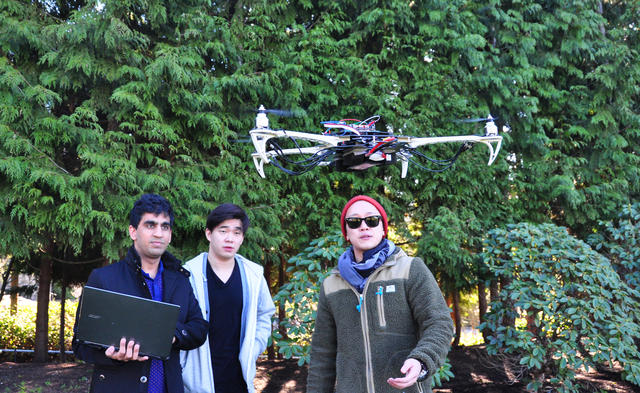Feb 28 2015
Four Simon Fraser University students, all from different countries, have used their common passion for innovation and flight to create a small, web-enabled drone that could enhance security systems—and has attracted the interest of SFU’s own security team.
 SFU students Mark Anthony Wijaya (holding drone), Shakir Ali (left), George Xu (and Akshay Budhiraja, not in photo) created Avian Robotics to produce an autonomous drone that could potentially enhance security systems.
SFU students Mark Anthony Wijaya (holding drone), Shakir Ali (left), George Xu (and Akshay Budhiraja, not in photo) created Avian Robotics to produce an autonomous drone that could potentially enhance security systems.
Calling their team Avian Robotics, the students say their product, known as Avian, is designed to improve response time to emergencies, effectively reduce blind spots, and create more robust security systems—all while being connected to and controlled via a laptop rather than a radio controller. It’s also 3-D printed, meaning the team can customize the size and shape while the product’s “brain” and inner electronics remain the same.
The students, who attend both Surrey and Burnaby campuses, will showcase Avian during the Surrey campus Global Community Open House on March 4.
Drone with a difference
“The big difference with our drone is that it is connected directly to the Internet via an existing WiFi infrastructure, so we are essentially turning a toy into a tool,” says Mark Anthony Wijaya, an undergraduate student focusing on international studies and entrepreneurship at SFU.
The drone is fully autonomous and capable of capturing high-quality images, and its parts can be upgraded using the team’s 3-D printed manufacturing process.
“We’ve created a complete cloud-connected surveillance system, and our auto pilot drones fly autonomously via pre-programmed and randomized routes,” says Wijaya. “Through testing and design improvements we have invested many hours. It turns out that each of us has a great passion for this work.”
SFU’s own director of security Steve MacLean shares the team’s enthusiasm for aviation and has offered his support. He has met with the students to discuss the project and the students’ aim of developing their unmanned aerial vehicle (UAV) into a security platform.
“This is pretty cutting-edge technology for the security industry, and it’s an idea we’ve been contemplating for some time,” says MacLean, now an advisor for the group. “These students are active and enthusiastic across their disciplines, and a good fit.”
Wijaya, who is from Singapore, has worked on a multitude of technology and socially innovative projects and is active in the university’s student entrepreneur community. He created IdEA (Interdisciplinary Entrepreneurship Association) to connect and support like-minded students from across disciplines. His co-creators at Avian include:
- George Xu, a Canadian student originally from Shanghai, and a graduate student in the School of Engineering Science and its Experimental Robotics Lab. Xu is a co-founder of Cloudy Robotics, which he helped found while working towards a degree in electrical engineering at the University of Waterloo;
- Shakir Ali, from India, an electronics enthusiast and Mechatronics Systems Engineering (MSE) student interested in how the Internet of Things can empower hardware, who spends his spare time tinkering with microcontrollers and embedded systems;
- Akshay Budhiraja, from Qatar, and also an MSE student, who started programming at the age of 10 and has won the SFU Engineering Competition for three years in a row (and will represent SFU at the Western Engineering Competition this spring). Budhiraja recently designed an android app to detect and help in the diagnosis of sleep apnea and other sleep disorders.